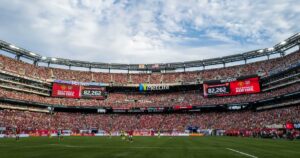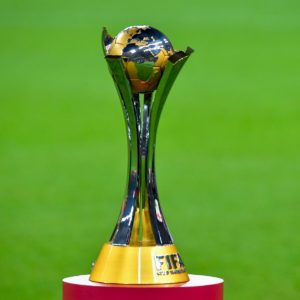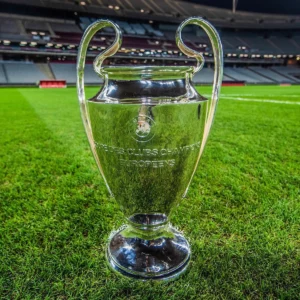Though yet to turn 25, Lionel Messi has already made sure of his place among the footballing gods, thanks to his devilish dribbling, pinpoint assists and an utterly insatiable appetite for goals, every single one of them dedicated to his grandmother Celia.
In tribute to his achievement on becoming Barcelona’s leading goalscorer of all time, FIFA.com picked out ten key dates in the irresistible rise of a pint-sized genius nicknamed La Pulga.
1 May 2005:
Aged 17 years, ten months and seven days, Messi becomes Barcelona’s youngest-ever goalscorer in opening his account for the club in a league meeting with Albacete. That record would be broken in October 2007 by Bojan Krkic, who struck his first Barcelona goal against Villarreal at the age of 17 years, one month and 20 days. And who provided Bojan with the assist? Yes, you’ve guessed it: Lionel Messi.
2 July 2005:
Messi scores twice, once from the penalty spot, as Argentina beat Nigeria 2-1 to win the FIFA U-20 World Cup Netherlands 2005. With the gold medal around his neck, and clutching the adidas Golden Boot in one hand and the adidas Golden Ball in the other, La Pulgahad announced himself on the world stage.
The pundits began to speak of the new Diego Maradona, who phoned the young pretender to wish him every success in his career. “This is the happiest day of my football career so far,” said Messi the world-beater afterwards. “All I’m thinking about is enjoying the moment. I’m thrilled at winning these individual awards, but the success of the team is what really counts for me.”
2 March 2006:
Jose Pekerman rewards Messi’s stellar performances in the Netherlands with a call-up to the full national team, handing the diminutive maestro his debut in August 2005. His first goal for his country would come in a 2006 FIFA World Cup Germany™ warm-up match against Croatia the following March, Messi putting his side 2-1 ahead after setting Carlos Tevez up for the opener, though the Croatians would come back to win 3-2. That maiden goal was the first of the 22 he has now scored for his country in 68 appearances.
10 March 2007:
Real Madrid take the lead three times in a pulsating clásico at the Camp Nou, only to be pegged back on each occasion by Messi, who completes a stunning hat-trick in stoppage time to earn an ovation from the Barça faithful. The last player to hit a treble in the fixture was Real Madrid’s Chilean centre-forward Ivan Zamorano in a 5-0 win 12 years earlier, with Romario scoring Barcelona’s previous hat-trick against Los Blancos in another memorable 5-0 drubbing the season before that.
18 April 2007:
Though Barcelona failed to collect any silverware that year, Messi confirms his place in the game’s elite with a stunning solo effort against Getafe in a Copa del Rey tie, a goal that is a virtual carbon copy of Maradona’s breathtaking strike against England at Mexico 1986.
“People are getting a bit carried away comparing the two goals,” said El Pelusa. “Messi’s a phenomenon. The sky’s the limit for him and I think he can hit an even higher level, but apart from being even better to look at, my goal came against the English in a World Cup quarter-final.”
Commenting on a goal that put him right up there with El Diez, the habitually modest Messi said: “I just saw the space and went for it. That was it. I took them on and all I wanted to do was go for goal and finish the move off.”
1 February 2009:
Barcelona are a goal down and a man down in a league match away to Racing Santander, with Messi on the bench. Stripping off his tracksuit, the Argentinian superhero comes to his side’s rescue, entering the fray to score a brace and secure three precious points. One of those goals was the club’s 5,000th in La Liga and the following year he would also scoreBarça’s 5,100th league goal in a game against Almeria. “He had two chances that weren’t even half chances and he took them both,” said Racing coach Juan Ramon Muniz with a mix of regret and admiration.
27 May 2009:
The impish Messi completes Barcelona’s 2-0 defeat of Manchester United in the UEFA Champions League final in Rome with an eye-catching header, soaring above United centre-half Rio Ferdinand, who is eight inches taller than him, to nod the ball past Edwin van der Sar. The goal confirmed Messi as the top scorer in the competition that season and also set the seal on the first treble of the Guardiola era. The club would end a glorious year by completing a clean sweep of six trophies, the last of them secured by an extra-time Messi strike in the FIFA Club World Cup final against Estudiantes.
29 February 2012:
La Pulga scores his first hat-trick for Argentina in a 3-1 friendly defeat of Switzerland, going some way to answering the fans who say he has yet to reproduce hisBarcelona form for his country. In hailing his captain, Albiceleste coach Alejandro Sabella said: “To have him is a blessing.”
7 March 2012:
“The throne belongs to him, and no one else but him will decide when he vacates it,” says Guardiola after Messi sinks Bayer Leverkusen with a five-goal salvo in the second leg of their Champions League Round of 16 tie. “He’s the best there is. There’s no one else. I can count myself lucky to have been his coach.”
“If you’re a fan then obviously you’re amazed by what he’s done, but speaking as a coach I was hoping he’d have an off day,” commented Bayer coach Robin Dutt. “Barça are the best team in the world even without Messi, but with him they’re in a different galaxy.”
20 March 2012:
And still the goals keep coming. For the last 57 years centre-forward Cesar Rodriguez has stood on his own at the top of Barcelona’s all-time goalscoring chart, having hit the back of the net 232 times for Los Azulgrana between 1939 and 1955. Along with Estanislao Basora, Laszlo Kubala, Moreno and Eduardo Manchon, he formed part of the legendary front line that fired Barça to five trophies in the 1951/52 season, a side known as El Barça de las Cinco Copas and immortalised in song by Joan Manuel Serrat.
But Messi was in the mood to break all the records. He scored Barcelona’s second against Granada on the 29th matchday in La Liga to draw level with Cesar on 232. The fans at the Nou Camp celebrated the goal as an image of Messi and Cesar appeared on the giant screen in the stadium. After Granada hauled the scores back to 2-2, Messi again came to the rescue and his elegant chip made it 3-2. He then went on to seal his hat-trick and set the new scoring standard for the club at 234.


